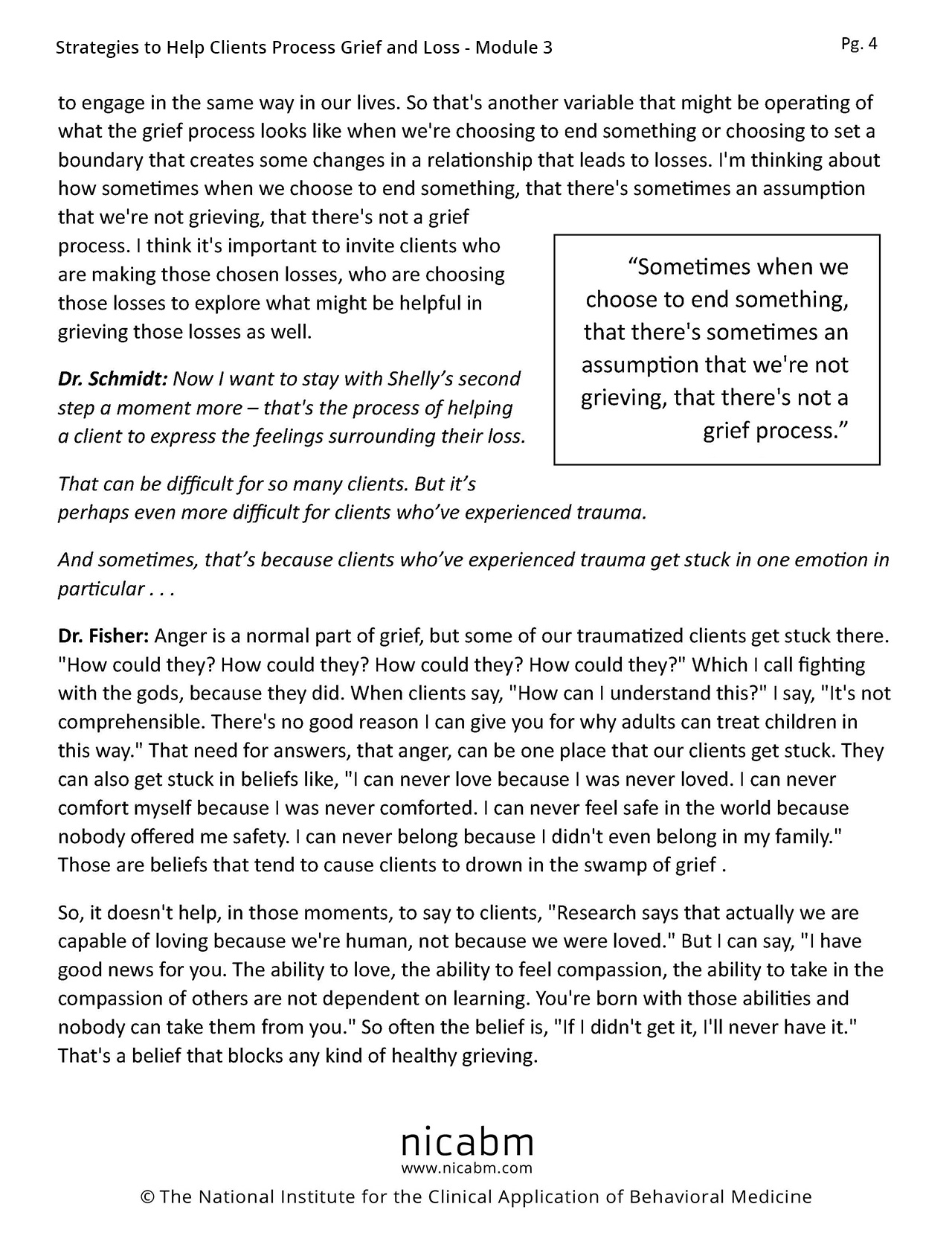
50% Off – Sale Ends Tomorrow
50% Off – Sale Ends Tonight
Now 50% Off for a Limited Time
Grief Is Rarely Straightforward
How to help your client find a path through grief and loss

 When a client loses someone or something they hold most dear, there’s a good chance their life will never feel the same again.
When a client loses someone or something they hold most dear, there’s a good chance their life will never feel the same again.
Because you see, it’s not always just the loss itself that weighs heavily on a client. They may also grieve what their life could have been.
It’s part of what makes grief such a complex emotion to navigate – for clients and practitioners alike.
So to help you work with the multi-faceted dimensions of grief and loss, we brought together 25 of the world’s top experts.
They’ll share how you can help clients process a major loss, re-engage with life, and find a sense of purpose and meaning in their grief.
— New Short Course —
Strategies to Help Clients Process Grief and Loss

Two Specific Types of Grief (and Strategies to Help Clients Process Each)
Janina Fisher, PhD Frank Anderson, MD Christine Padesky, PhD
Joan Borysenko, PhD Zindel Segal, PhD Dennis Tirch, PhD
- Three Questions to Help You Begin Your Work with a Client Who’s Grieving
- Cultural Considerations to Factor into Your Work with Grief
- How to Assess How Much a Time a Client Might Need to Grieve
- Specific Warning Signs That a Client Is ‘Stuck’ in Their Grief
- Strategies to Identify and Work with Prolonged Grief Disorder

Rethinking the Stages of Grief (and How That Might Impact Your Approach)
Chris Willard, PsyD Shelly Harrell, PhD
Eboni Webb, PsyD Joan Borysenko, PhD, Zindel Segal, PhD
- Recently Recognized Stages of Grief (and How They Can Arise)
- Two Specific Scenarios That Can Lead to Complicated Grief
- Complications That Often Arise During the Grieving Process (and How to Address Them)
- How to Work with Clients Who are Stuck in the Anger Stage of Grieving

How to Help Clients Cope with the Loss That Led to Their Grief
Janina Fisher, PhD George Faller, MS
Shelly Harrell, PhD Kelly Wilson, PhD Dennis Tirch, PhD
- Three Categories of Loss: How to Help Clients Better Connect with What They’ve Lost
- A Four-Step Process to Help Clients Begin to Integrate Their Loss
- How to Work with One Trauma-Based Emotion That Can Prevent Clients from Moving On After a Loss
- Strategies to Target the Key Link Between Loss and Regret

How to Work with Trauma When It Complicates the Grieving Process
Richard Schwartz, PhD Janina Fisher, PhD
Frank Anderson, MD Deany Laliotis, LICSW
- One Key Step to Take with Trauma Survivors BEFORE Addressing Their Grief or Loss
- An Internal Family Systems Approach to Working with Trauma-Fueled Grief
- Case Study: How to Address a Past Trauma That Activates Grief in the Present
- Two Key Factors That Have Been Shown to Predict a Client’s Resilience to Grief (and How This Research Can Influence the Language You Use in Session)

Strategies to Help Young Clients Navigate Grief and Loss
Lynn Lyons, LICSW
- Strategies to Support Children (and Their Parents) Through the Grieving Process
- Two Commonly Observed Behaviors in Young Children Who Are Grieving
- A Three-Step Process to Help Older Children Navigate Grief
- A Developmentally Appropriate Strategy to Help Children Integrate Grief

How to Help Clients Navigate the Collective Grief of a Racial or Cultural Trauma
Shelly Harrell, PhD Usha Tummala-Narra, PhD
Eboni Webb, PsyD Raymond Rodriguez, LCSW-R
- One Common Way That Grief Can Have an Intergenerational Impact
- How to Work with the Recurring Grief That’s Often Fueled by Racism
- A Two-Step Strategy to Help Clients Cope with Losses Related to Their Culture of Origin
- How to Apply the Stages of Grief to Your Work with Racial Trauma

How to Help Clients Re-Engage with Life and Find Meaning in Their Loss
Ruth Lanius, MD, PhD Russell Kolts, PhD
Elliott Connie, MA, LPC Michael Yapko, PhD
- How to Help Clients Regain a Sense of Normalcy After a Loss
- One Strategy to Help Clients Embrace Moments of Joy During Their Grieving Process
- A Strategy to Help Clients Take Breaks from Grieving and Re-Engage with Daily Life
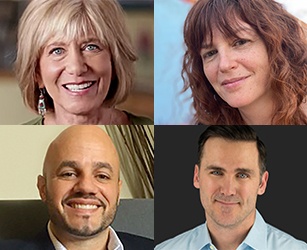
How to Work with the Inextricable Link Between Grief and Love
Joan Borysenko, PhD Juliane Taylor-Shore, LPC, LMFT, SEP
Chris Irons, PhD George Faller, MS
- How to Help Clients Build Strength and Courage to Help Tolerate Feelings of Grief
- How Love Can Help Clients Come to Terms with the Inevitably of Grief and Loss
- Why Compassion is Well-Suited to Help Clients Navigate Grief (and Strategies to Help Cultivate It)
- How to Kickstart a Client’s Grieving Process by Extending Your Own Love and Compassion to Them (In a Way That Isn’t Activating)
Register Here for $197 $97
and get all the videos, audios, transcripts, learning tools, plus 3 bonuses
to help clients work through feelings of grief and loss
Sign Me Up
Up to 7.75 CE/CME Credits or Clock Hours are available for purchase at checkout.
Click HERE to get information about CE/CME credits and clock hours as well as speaker disclosures
For This Short Course, We Brought Together Some of the Top Experts in the Field
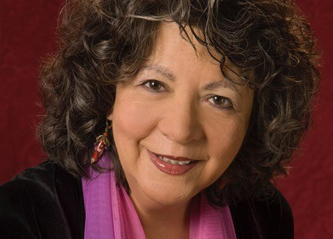
Janina Fisher, PhD
Licensed clinical psychologist and former instructor, Harvard Medical School; Advisory Board member of the Trauma Research Foundation
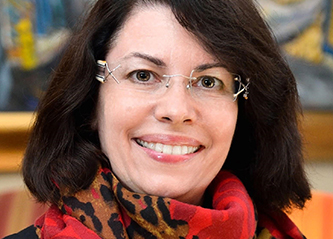
Ruth Lanius, MD, PhD
Professor of Psychiatry and Director of the Post-traumatic Stress Disorder (PTSD) research unit at the University of Western Ontario. Coauthor of The Impact of Early Life Trauma on Health and Disease: The Hidden Epidemic, and Healing the Traumatized Self: Consciousness, Neuroscience, Treatment.

Richard Schwartz, PhD
Founder of Internal Family Systems (IFS) and The Center for Self Leadership; Author of Introduction to Internal Family Systems.

Pat Ogden, PhD
Pioneer in Somatic Psychology; Founder and Director of Sensorimotor Psychotherapy Institute (SPI); Co-founder of the Hakomi Institute; Author of Sensorimotor Psychotherapy: Interventions for Trauma and Attachment.

Frank Anderson, MD
Licensed psychiatrist and psychotherapist; program consultant for the IFS Institute; advisor to the International Association of Trauma Professionals; author of Transcending Trauma: Healing Complex PTSD with Internal Family Systems.

Usha Tummala-Narra, PhD
Professor of Counseling, Developmental, and Educational Psychology at Boston College; Author of Psychoanalytic Theory and Cultural Competence in Psychotherapy; Co-author of Applying Multiculturalism: An Ecological Approach to the Multicultural Guidelines.
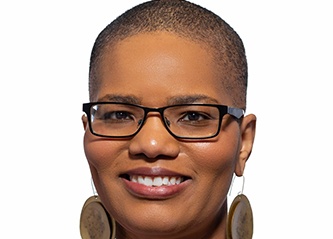
Eboni Webb, PsyD
Licensed psychologist; specializes in DBT for trauma-based disorders and co-occurring disorders; advisor to the DBT National Certification Accreditation Association.
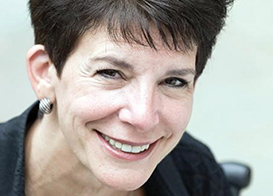
Deany Laliotis, LICSW
Director of Training at EMDR Institute; Specialist in treatment of traumatic stress disorders and attachment issues; author of chapters and articles on EMDR therapy.
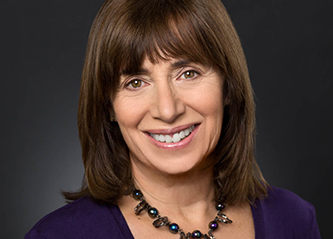
Ellyn Bader, PhD
Co-creator of The Developmental Model of Couples Therapy; Co-director of The Couples Institute.
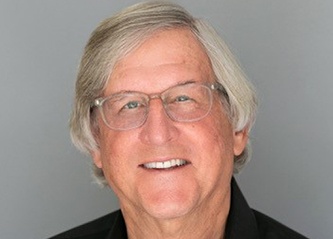
Michael Yapko, PhD
Leading expert in clinical hypnosis and treating depression; Clinical psychologist and author of 15 books including his newest books, The Discriminating Therapist and Keys to Unlocking Depression.

Kelly Wilson, PhD
Co-author of Acceptance and Commitment Therapy: An Experiential Approach to Behavior Change; Founder of OneLife Education Training, LLC.

Joan Borysenko, PhD
Founder of Mind/Body Health Sciences LLC; Author of New York Times Bestseller Minding the Body, Mending the Mind.
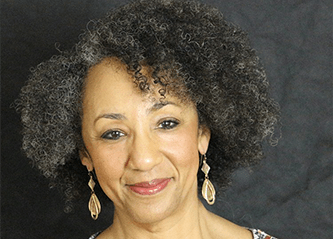
Shelly Harrell, PhD
Licensed psychologist specializing in multicultural and community psychology; Professor of Psychology in the Graduate School of Education at Pepperdine University.
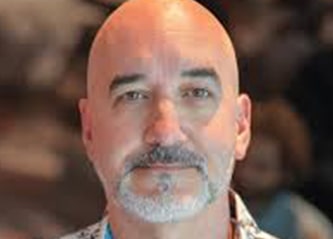
Dennis Tirch, PhD
Founding Director of The Center for Compassion Focused Therapy; President of The Compassionate Mind Foundation of North America; co-author of Experiencing ACT from the Inside Out: A Self-Practice/Self-Reflection Workbook for Therapists.
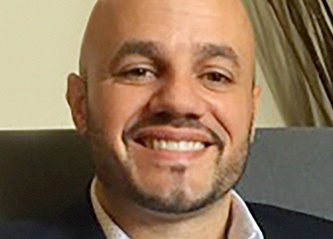
Chris Irons, PhD
Clinical psychologist; Co-Director of Balanced Minds; author of The Compassionate Mind Approach to Difficult Emotions: Using Compassion Focused Therapy;Creator of The Self-Compassion App and Co-Author of the Compassionate Mind Workbook.
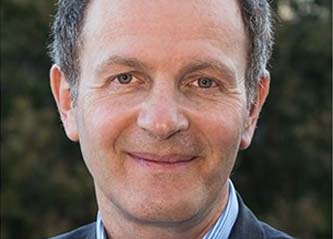
Zindel Segal, PhD
A founder of Mindfulness-Based Cognitive Therapy (MBCT); Professor of Psychology at the University of Toronto.
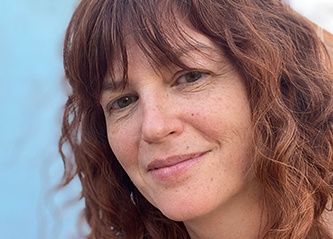
Juliane Taylor Shore LPC, LMFT, SEP
Licensed therapist; expert in trauma recovery and couples counseling; specializes in applying Interpersonal Neurobiology to the healing of trauma; founder of IPNB Psychotherapy of Austin
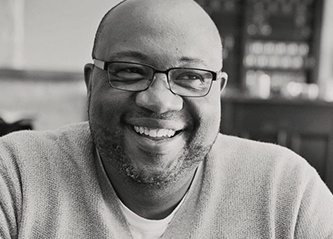
Elliott Connie, MA, LPC
Licensed psychotherapist; founder and Director of The Solution Focused University; co-author of The Art of Solution Focused Therapy.

George Faller, MS, LMFT
Licensed marriage and family therapist; founder and President of the New York Center for EFT; retired Lieutenant of the NYC Fire Department.
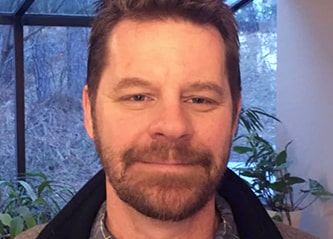
Russell Kolts, PhD
Clinical psychologist and professor of psychology at Eastern Washington University; Founder and Director of the Inland Northwest Compassionate Mind Center; author of The Compassionate Mind Approach to Managing Your Anger.
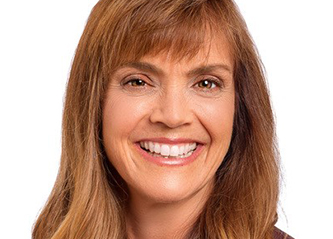
Lynn Lyons, LICSW
Author of Anxious Kids, Anxious Parents: 7 Ways to Stop the Worry Cycle and Raise Courageous & Independent Children, clinical social worker and psychotherapist specializing in anxiety in adults and children.
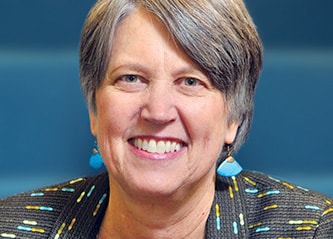
Christine Padesky, PhD
Co-founder of the Center for Cognitive Therapy in Huntington Beach, California; Co-creator of Strengths-Based CBT; Co-author of Mind Over Mood and Collaborative Case Conceptualization.

Raymond Rodriguez, LCSW-R
Licensed clinical social worker specializing in trauma therapy with members of marginalized communities; Adjunct Faculty Member at Columbia University School of Social Work; Faculty Member of the Sensorimotor Psychotherapy Institute.

Ron Siegel, PsyD
Assistant Professor of Psychology, part time, Harvard Medical School; Author of The Mindfulness Solution: Everyday Practices for Everyday Problems and Sitting Together: Essential Skills for Mindfulness-Based Psychotherapy.

Christopher Willard, PsyD
Psychologist and educational consultant specializing in mindfulness; president of the Mindfulness in Education Network; serves on the board of directors at the Institute for Meditation and Psychotherapy.
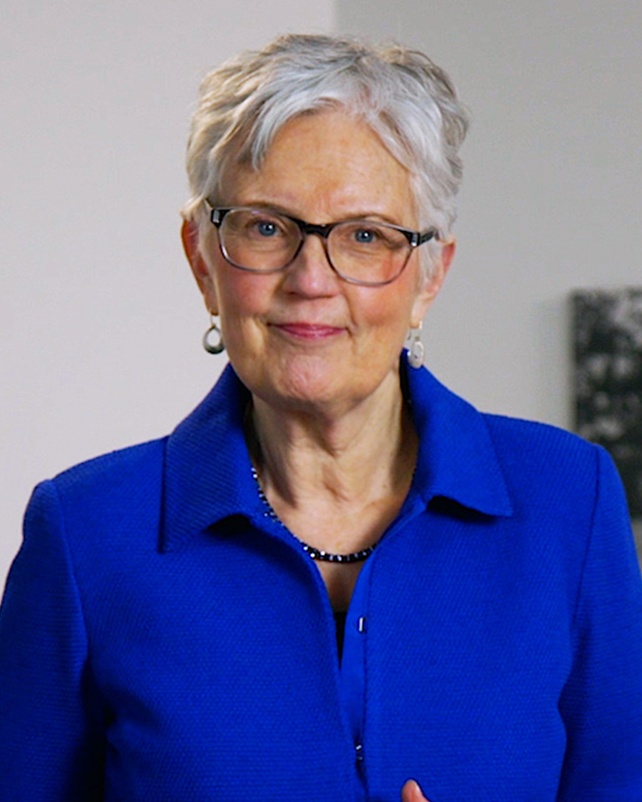
Course Director
Ruth Buczynski, PhD
Here's What You'll Get:
Everything is yours to keep forever in your professional library
|
|
Downloadable videos so you can watch at your convenience, on any device |
|
|
Audio recordings you can download and listen to at home, in the car, at the gym or wherever you like |
|
|
TalkBack Segments to distill key ideas (this is where we “land” the session) |
|
|
Next Week in Your Practice sessions to give you concrete strategies to use with clients |
|
|
Professionally-formatted transcripts of the sessions, to make review and action simple |
|
|
Three downloadable bonus videos to help clients work through feelings of grief and loss |
You’ll Also Get These 3 Bonus Sessions with Even More Strategies to Help Clients Work Through Feelings of Grief and Loss

Bonus 1: How to Work with Grief Caused by Infidelity
Ellyn Bader, PhD
- The Two Stages of Grief That Clients Often Experience After an Infidelity
- Specific Language to Help Clients Explore Next Steps Once an Infidelity Is Revealed
- How to Create Space for Clients to Process the Grief and Emotions That Accompany an Experience of Infidelity

Bonus 2: Working with the Body to Help Clients Process Grief
Janina Fisher, PhD Ruth Lanius, MD, PhD
Pat Ogden, PhD Zindel Segal, PhD
- Research on How the Body and Brain Respond to a Major Loss
- How Mindfulness Can Help Reduce the Impact of Biological Defense Responses to Grief
- Using Psychoeducation and Biofeedback to Help Clients Better Connect with Feelings of Grief

Bonus 3: The Role of Self-Disclosure and Countertransference in Grief Therapy
Chris Willard, PsyD Deany Laliotis, LICSW
George Faller, MS Usha Tummala-Narra, PhD
- How to Hold Space for a Client’s Grief When It Activates Your Own Unresolved Grief
- How To Decide When to Disclose Your Own Experiences of Grief with a Client
Register Here for $197 $97
and get all the videos, audios, transcripts, learning tools, plus 3 bonuses
to help clients work through feelings of grief and loss
Sign Me Up
Up to 7.75 CE/CME Credits or Clock Hours are available for purchase at checkout.
Click HERE to get information about CE/CME credits and clock hours as well as speaker disclosures
Starting Today, This Program Can Change the Way You Practice

. . . I feel so fortunate to have this access to brain power, experience and research synthesis . . .
“When I listen to the experts talk openly about their experience, I feel so fortunate to have this access to brain power, experience and research synthesis on cutting edge issues! I go back to the videos to reinforce things that will assist my clients.”
Mary Logan, Counselor
Ipswich, MA

I benefit, my practice benefits, and most important my clients benefit . . .
“I live in Nova Scotia and have limited travel funds at the university at which I work. The series provided by NICABM gives me the rare opportunity to listen to the leaders in the field. As a result, I learn valuable information that would not otherwise be available to me. I benefit, my practice benefits, and most important my clients benefit from the knowledge and wisdom I gain from the series.”
David Mensink, PhD Counseling Psychology, Psychologist
Halifax, Nova Scotia, Canada

. . . some dare to go the extra journey to research and educate
“These NICABM series keep me afloat, in touch, on track, well trained in my field, and more personally healthy. The best aspect, though, is that I feel validated and comforted knowing that some dare to go the extra journey to research and educate, so I can walk the path to health, and can share with others.”
Mary Corsello-Vilcheck, LCSW
Midlothian, VA
Why the Transcript Is Essential:
- The transcript makes it easy to go back and double check concepts, citations and names that are mentioned
- We put in a table of contents to make it easy for you to find the exact part of the webinar you need
- Having the concepts already written allows you to take notes on how you’re going to use the ideas rather than transcribing the ideas
- Some people simply learn better by reading than by listening or watching
- You will be able to print out and share techniques presented in the session with your patients

“I really liked being able to follow along with the transcripts as I listened…it was nice not to feel like I had to take notes. I really feel like I remember more when I both hear and see at the same time.”
Mary Ellen McNaughton, Masters in Counseling, Psychology Counselor
Kelowna, British Colombia, Canada
You Are Protected By
NICABM’s Money-Back Guarantee
We invite you to register for this training program without any risk. Unless you are completely satisfied, we will refund your money. Just let us know within 30 days from the date of registration. We are that confident that you will find this information to be more than you expected.
Register Here for $197 $97
and get all the videos, audios, transcripts, learning tools, plus 3 bonuses
to help clients work through feelings of grief and loss
Sign Me Up
Up to 7.75 CE/CME Credits or Clock Hours are available for purchase at checkout.
Click HERE to get information about CE/CME credits and clock hours as well as speaker disclosures

